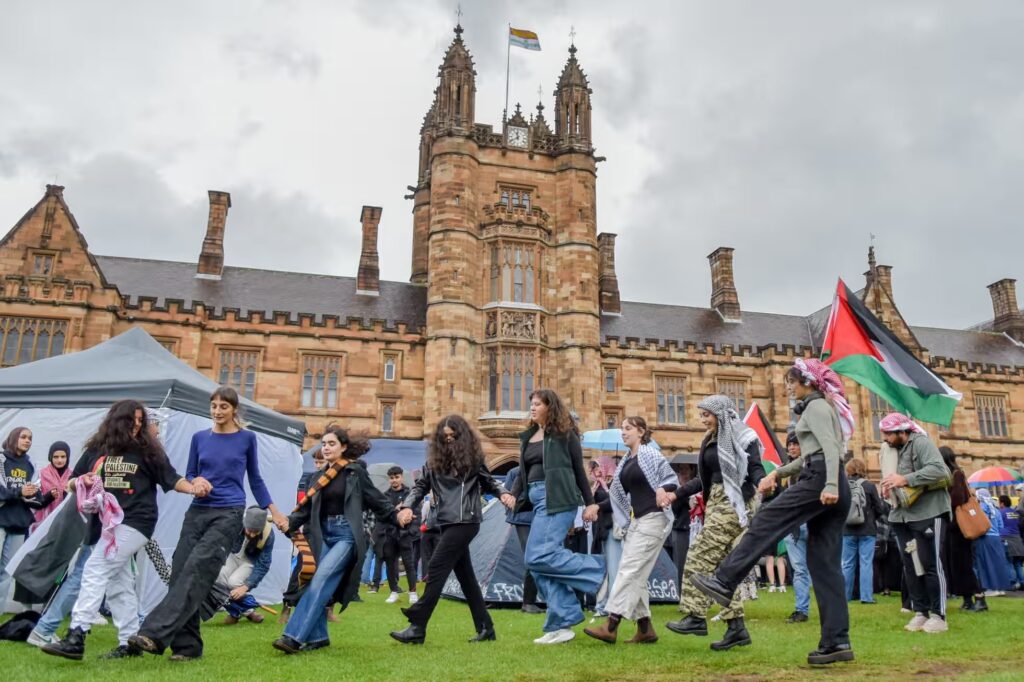IN THE MEDIA
A university is for a multiplicity of ideas
July 18, 2024 | Rabbi Ralph Genende

Australian Jewish News – 19 July 2024
The word university is derived from Latin universitas magistrorum et scholarium, which roughly means a community of teachers and scholars. In this sense, it is closely aligned with the purpose of Judaism’s highest place of learning, the yeshiva. Both are intended to be places that increase knowledge, revere scholarship and respect teachers. Yeshiva simply means a place where you sit (yoshev) and study.
Study for its own sake and not for an ulterior motive is one of the most highly prized virtues in Judaism. It is called Torah for its own sake, Torah Lishma; Hilel, the great Talmudic teacher, warned against using the Torah as a personal crown to magnify yourself, or as a spade to dig or exploit for your own power or self-aggrandisement.
The ideal of a university was to be an introduction into the community of scholars and an immersion in the intellectual tradition of humanity, a celebration of our collective wisdom. As Abba Eban fabled FM of Israel, and a Cambridge graduate, once quipped while speaking there: ‘It was here that I learned the integrity, honesty and love of truth… that have been such a disadvantage to me in my political career!’
From Socrates to Eban, Abraham to Hilel, the hallmark of enlightened literacy has been the willingness to engage in critical scrutiny, to wrestle with ideas that challenge and are often contrary to your viewpoint, to feel enlarged rather than alarmed by opposing thoughts and concepts.
Over the past few decades, these noble ideals and aspirations have been diminished, if not abandoned. It can perhaps be traced back to the commodification of education – a degree is no longer a sign of excellence, but a ticket to a better job and salary, a spade to dig for a lucrative place rather than develop a finer mind and richer soul.
The crass commercialisation was accompanied by another trend, what Lukianoff and Haidt refer to as the coddling of the mind, a vocabulary of identity politics that dumbs down education and narrows the principles that have sustained Western democracy such as recognition and tolerance of difference as a way of creating unity and protecting the freedom of all. Instead, our universities have created a culture of grievance, resentment and rage which is fertile ground for the kind of vituperative antisemitism we are witnessing.
Rabbi Jonathan Sacks, before his untimely death, warned about this trend in his final book, Morality: It turns, he said, difference into exclusion and suspicion, it builds walls not bridges. It abdicates the hard work of understanding, respecting and working with and for people who are not like us.
The preoccupation with exclusionary identities, de-platforming, safe spaces and microaggressions have ironically increased the lack of secure spaces for, and indeed aggression against, Jewish students. They have also addled the minds of the university administrators and countless academics. George Orwell is supposed to have said ‘Some ideas are so stupid only intellectuals would believe them’. He certainly did say the following sentence which is engraved above a statue of him in London: ‘If liberty means anything at all, it means the right to tell people what they do not want to hear’. Of course, this needs to be done in a spirit of respect and love of learning and the pursuit of truth, not dogma, principle not politics nor propaganda.
What we are witnessing on Australian campuses is a shameful capitulation of leadership. It boggles the mind how a learned man like Mark Scott can engage in such tortured logic to justify the failure of his institution and his role to live up to the purpose of the university: to teach about morality not power, to encourage a multiplicity of ideas and voices rather than favouring one group. It is simply astounding how universities can close the minds of their students to the gateways of critical debate.
Like the honoured Ivy League presidents in the USA, he and most of our other prized University leaders in Australia have fed the poisoned ivy of ignorant opinions and cowardice. They have pandered to protestors of shady and dubious intent such as the Islamist extremist group Hizbut Tahrir.
Nobel laureate, Herta Muller laments that after spending 30 years under a dictatorship she thought that only in a dictatorship people were systematically dumbed down as thinking is forbidden. “I am horrified” she says “that young people and students in the West in particular are so confused that they are no longer aware of their freedom that they seem to have lost the ability to distinguish between democracy and dictatorship”.
Judaism has always championed a diversity of opinion. “These and these opinions count” is the leitmotif of the Talmud. And that’s a timely lesson for our universities!





